Camping on hot, summer days is a favorite activity for many. One of the most essential camping items you will require is a tent. You will use your tent a lot to sit in to get away from bugs and sleep in at night.
Most tents these days are pretty comfortable but they can get overheated in humid climates and feel like a hot sauna sometimes. Most people are not accustomed to a hot and humid climate, so it is difficult to sleep or even stay inside a tent without proper air cooling.
If the campsite is powered with electricity, then there are many cooling options. But in case there is no power, there are many battery-operated appliances available on the market to cool the tent down. A tent air conditioner is the most cost-effective solution and makes a big difference while camping out in the heat.
At a Glance: Our Top Picks for Tent Air Conditioners
- OUR TOP PICK: Zero Breeze Mark 2
- Tripp Lite SRCOOL12K
- SereneLife SLPAC10
Comparison of the Best Air Conditioners For Tents
| IMAGE | PRODUCT | |
|---|---|---|
Our Top Pick 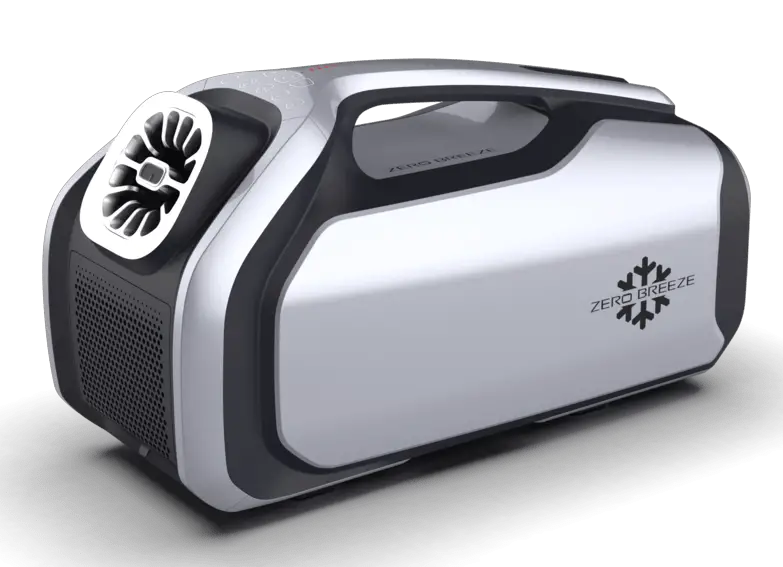 |
| View Latest Price → |
 |
| View Latest Price → |
 |
| View Latest Price → |
 |
| View Latest Price → |
Tips to Keep Your Tent Cool
While camping in summer can be very enjoyable, sleeping in a hot and humid tent isn't the most enjoyable entertainment.
Sure, you have the option of carrying a generator and an AC, but let's go through a few tricks old campers would teach you first. These can also increase the AC efficiency if you take one along.
Choose the Tent Spot Wisely
This factor is one of the staples of camping: finding the perfect spot for the tent is a "science" in its own right. You need the ideal amount of shade during the hottest hours. For a more advanced approach, you can also consider the wind direction and other factors.

Use a Reflective Screen
If you can't find a shade, use a reflective screen to keep the direct sun rays off your temporary home as much as possible.
Choose a Mesh Tent
Keeping the hot air from coming in and getting trapped is crucial. If the weather is dry (no rainfall predicted), you can remove all the solid covers and let the tent breathe for a while.
How Much Cooling Do You Need?
Tents don't have electric power or a centralized cooling system. For keeping cool in the tent, you need a generator, a campsite with an electric hookup, or air conditioning units that run on battery power. The portable battery-powered AC units have a capacity of cooling the room size of 50 sq. ft. to 250 sq. ft. For a 150 sq. ft. tent, you will need an AC unit that has a 5000 BTU rating to keep the tent cool. Any lesser BTU rating will not keep you cool enough all night. The bigger the tent, the more BTU rating is needed.
Typically, battery-powered units run on 12 volt batteries and have a battery life of 10 hours on as low as 40W. These units usually weigh anywhere from 10 to 70 lbs. but their efficiency is in no way related to their weight. The weight is important just for the portability. The performance of each unit is different. Some AC units keep the tent temperature as low as 35 degrees Fahrenheit for just one hour while some hold the temperature for as long as 10 hours, it all depends on the model you buy.
Moreover, in the woods the temperature dips considerably at night. So, the AC unit does not need to use the same power to maintain a consistent temperature all night long. Once the tent is cool enough for you to sleep comfortably, the air conditioner can lessen the cooling power because the dip in outside temperature will then keep your tent cool enough.

What to Look For in a Tent AC Unit
There are many types of AC units available for tents. There are options such as battery powered fans, evaporative coolers, ice chest blowers, window AC, and room AC. Generally, at the campsites, the climate gets significantly cooler after midnight. So, the AC you choose needs to be according to the climate you are in. The best air conditioner is a combination of the majority of the following features:
Portability
The AC units to be used while camping need to be moved a lot. So, the lighter it is, the better it is. If the unit is not compact, it will be very difficult to move it.
Power
The unit has to give a cooling effect in a small closed space. It has to be powerful enough to maintain the same temperature all through the night.
Size
The AC unit has to be as compact as possible. If it is too big, you will feel cold and damp. And if it is too small, it will cool only a specific area. You need at least 5000 BTU capacity for a good-sized family tent. The three common sizes are 5000 BTU, 6000 BTU, and 8000 BTU.
Room or Window
There are both types available. Window ACs have to be rigged to exhaust air through the window of the tent and are usually superior in cooling capacity.
Room ACs are bulkier but easier to set up than the window ones. Moreover, they are convenient for using in houses also.
Price
Though the buying decision should be more dependent on the above features, price does make a difference. The best AC unit to buy should be reasonably priced and yet able to perform as expected.
Read on to learn what to look for and for reviews of these and others!
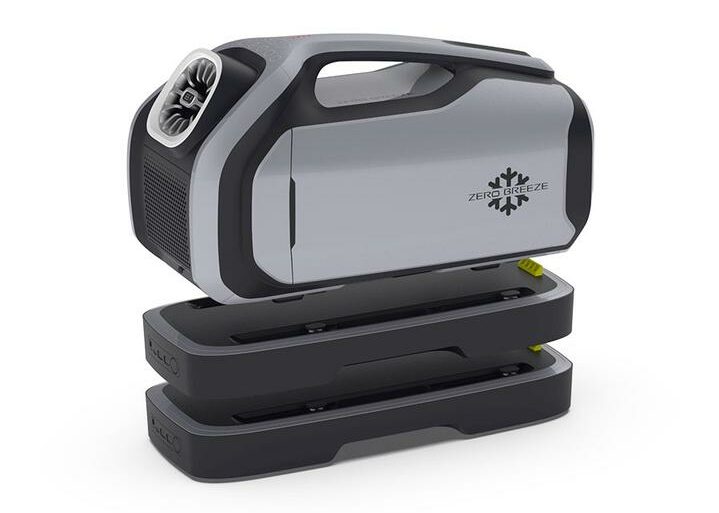

Zero Breeze Mark 2
Key Terms to Know
To help compare products in this review, we have included a few key specifications for each. Here is a quick summary of what they mean.
- BTUs: British Thermal Unit (BTU) measures energy. This refers to the energy necessary to increase the temperature of one pound of water by one degree Fahrenheit.
- Dimensions: The actual dimensions in l x w x h.
- Weight: The physical weight of the air conditioner.
- Voltage: The amount of electricity the unit uses. This determines the type of outlet it must plug into.
Review of the Best Air Conditioners For Tents
We have compiled a list of what we feel are the 5 best air conditioners that will keep your tent cool and dry during the hot, humid nights. Remember, these are portable and compact AC units so they can’t be expected to perform exactly like the ones in your house. They will, however, do a great job cooling your tent area.
Best Overall:
Zero Breeze Mark 2
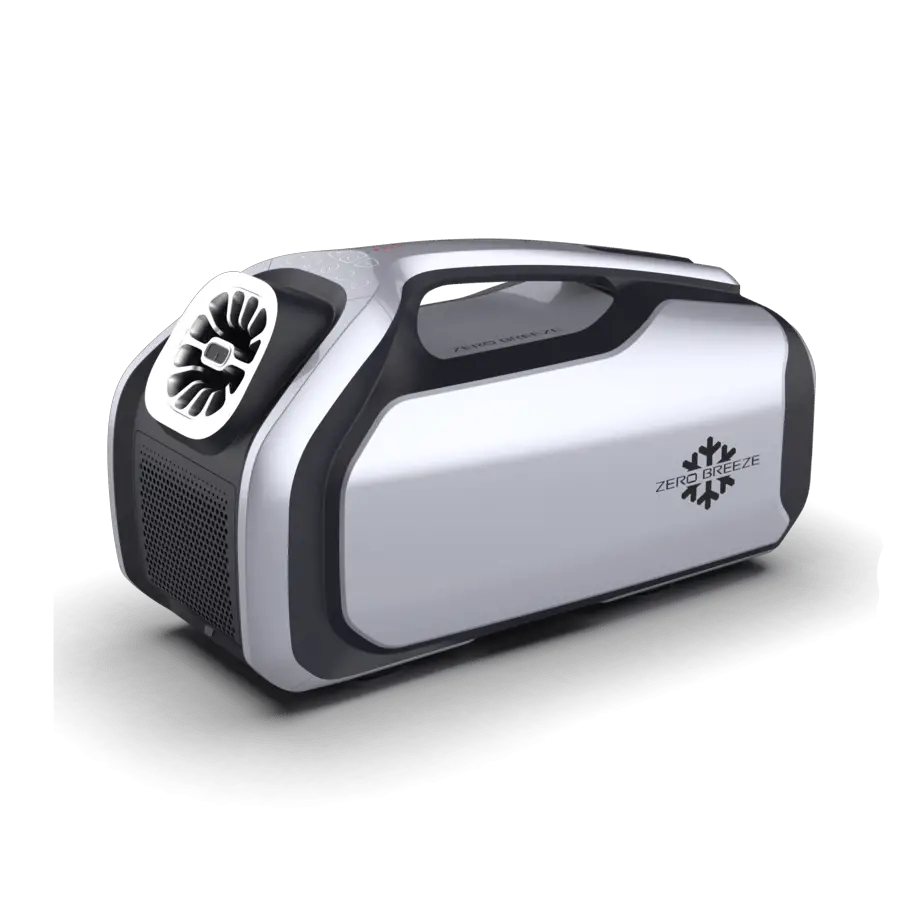



PROS
CONS
What Recent Buyers Report
A high percentage of positive responses suggest the outstanding quality of this amazing air conditioner. Users are quite amazed by its efficient cooling and superb operation. They believe that it is one of the most advanced and user-friendly air conditioners available. It is highly recommended by most recent buyers.
Why it Stands Out to Us
The Zero Breeze Mark 2 is a trademark of pure cooling performance and elegant design. It not only offers a unique and attractive look but also delivers the task quite reliably. This little portable air conditioner uses advanced technology that cools your living space in no time. Plus, its portability allows you to carry it almost anywhere you want.
The cooling operation is second to none. With highly efficient cooling, it keeps the heat at bay even during hot summers. At the same time, it offers a user-friendly design and operability that is very simple and easy to use.
Bottom Line
If you are looking for a reliable solution to keep your sweat off, we recommend purchasing this air conditioner. Simple, easy to use, and highly efficient, this unit makes for a great purchase. You can also carry it anywhere to enjoy the cool fresh air.
Product Specs
BTUs:
2,300
Dimensions:
20 x 10 x 11"
Weight:
16.5 lbs
Voltage:
24V DC / 240 W
Power Source:
Battery Powered
2. Tripp Lite SRCOOL12K

PROS
CONS
This air-filtering, dehumidifying, compact window AC is a perfect fit for tent cooling. It has the feature of automatic restart in case of outages.
Product Specs
BTUs:
12,000
Dimensions:
19.69 x 12.6 x 32.68"
Weight:
73.9 lbs
Voltage:
120V
Power Source:
Electric
3. SereneLife SLPAC

PROS
CONS
According to SereneLife, the unit works wonders in dehumidification and silent operation. While these factors might not be the first choice triggers, this unit bosts efficiency. Although the ASHRAE rating is 10,000 BTU, the actual cooling power efficiency isn't too low either (6,000).
Another highlight of this air conditioner is its lightweight body and sleek design. You can put it in the car and take it along on your next camping trip. The only concern is that you do need a generator to make this AC work. It requires 120 volts and 1150 watts to operate.
Bottom Line
This portable air conditioner is an excellent find for a camper who doesn't want anything bulky, and at the same time, needs some functionality.
It's light and sleek and can cool a small-to-medium tent properly. It might not work wonders but will provide you with essential features, including cooling, fan, and dehumidification.
Product Specs
BTUs:
10,000
Dimensions:
13.39 x 32.09 x 17.45"
Weight:
65 lbs
Voltage:
120V / 1150W
Power Source:
Electric
4. Frigidaire FFRA051WAE
No products found.
PROS
CONS
This compact window AC is light enough and small enough to be the perfect choice when you want real AC comfort in your tent. It has been a consistent best-seller since it is both inexpensive and a performer.
Product Specs
BTUs:
5,000
Dimensions:
15.25 x 16 x 12"
Weight:
35.27 lbs
Voltage:
115V / 450W
Power Source:
Electric
5. Zero Breeze
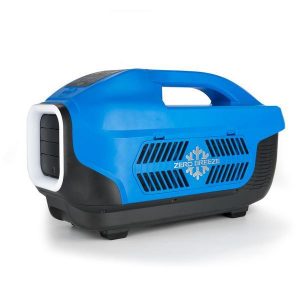



PROS
CONS
This AC unit for your tent is extremely effective in decreasing the temperature inside to a comfortable level. The product weighs roughly 12 pounds and can be easily carried around between tents or small vehicles. The built-in dehumidifier also helps to get rid of that sticky or damp feeling that most campers tend to suffer from during humid weather.
You’ll be happy to know that the battery life of the unit is decent, as it lasts up to five hours, more than enough time to give you a decent break from those humid, scorching days. If you want it to last longer, you could easily use another interchangeable 12V battery and just charge the other until the new battery runs out.
Bottom Line
This tent AC is fairly effective at cooling down the inside of your tent to a comfortable temperature. And you’ll greatly benefit from the lightweight design that allows you to carry it around anywhere without any hassle.
For such a small product, it’s incredible that you have the huge advantage of having a dehumidifier built in with a continuous drain option which means you can use it as long as the battery is charged.
The battery life is another advantage, as it can last up to five hours, as well as being interchangeable, meaning you can keep it working for a lot longer if you have a backup battery.
The only downside is the awkward ventilation option, you’ll need to make sure that the venting is pointing outside of your tent otherwise your tent will become a huge puddle by the morning due to the dehumidifier, as well as causing the interior to become warmer due to the compressor spewing warm air into the tent and not outside. As long as you find a decent position for your AC you’ll have the full benefit of this product and you’ll be really happy with the results.
Read the full Zero Breeze review here.
Product Specs
BTUs:
1,100
Dimensions:
19 x 11 x 7.8″
Weight:
12 lbs
Voltage:
24V DC / 240 W
Power Source:
Battery Powered
6. EdgeStar AP14003W Portable Air Conditioner
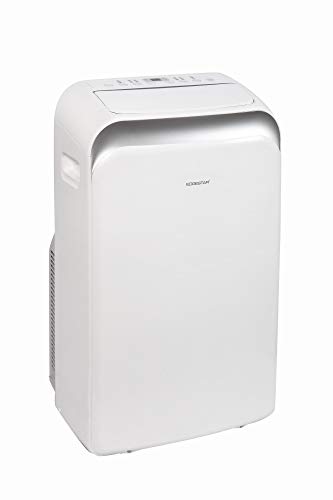
PROS
CONS
If you're searching for a lovely addition to your camping endeavors, this unit has a place on your list. Not only is it a sleek and easily maneuverable appliance, but it's also powerful. Although it can cool a 500 square feet room, cooling a tent is much more challenging. Still, this Edgestar portable AC can work in a small one.
If moisture is your problem during the travels, the dehumidification mode can take out 71 pints of moisture per day. This is a high number compared to other systems on the market.
If you're into hiking, you can leave the AC on and program it to start cooling just as you return, tired and in need of a little cool.
Bottom Line
This air conditioner solves most of your problems during camping. If you're contemplating if it's worth buying an AC or a fan, this unit and its fan-only mode can answer your question. Need dehumidification? It has that too.
The EdgeStar unit is a multi-purpose unit with a dehumidifier option. The best part of this unit is that it is very easy to carry and can easily be enjoyed in the house when you are not out camping.
Product Specs
BTUs:
14,000
Dimensions:
30 1/8" H x 18 3/8" W x 15 5/8" D
Weight:
72.8 lbs
Voltage:
115V
Power Source:
Electric
7. GO COOL Portable Air Conditioner
No products found.
PROS
CONS
This small cooling device chills enclosed places using ice water. It needs to be filled with ice water and works on batteries. The unit has space to hold bottles of water and containers of ice. It comes with its own fuel storage.
Product Specs
Voltage:
12V
Power Source:
Battery Powered
8. Avallon 14,000 BTU Dual Hose Portable Air Conditioner

PROS
CONS
This sleek-looking portable air conditioner is the ultimate choice considering the features, as well as capacity. With its heavy capacity, it can also cool larger tents. It is an intelligent AC with an invisimist feature that evaporates the water and does not need drainage.
Product Specs
BTUs:
14,000
Dimensions:
15.7 x 19.5 x 33.7"
Weight:
73 lbs
Voltage:
115V / 1250W
Power Source:
Electric
9. Palmer Personal Space Air Coolers
No products found.
PROS
CONS
What Recent Buyers Report
Recent buyers didn’t only get comfortable and fresh clean air by investing in this model, they also received permanent convenience. The most noteworthy feature, according to them, is the design, which ensures easy maintenance. The filters are completely washable and help maintain cleaner coils inside too.
Why it Stands Out to Us
When it comes to air conditioners, the thing people fear most is the annoying sound that it makes. Well, with this unit, you don’t have to face this issue. It comes with high-end construction that ensures advanced batteries that generate power. This results in an extremely quiet environment for everyone sitting in the room.
Who Will Use This Most
This model is suitable for anyone wanting to enjoy a pleasant breeze inside their rooms, and its compact size makes portability very easy. Moreover, it can be attached to both your cell and your car, which adds to the diversity. This, coupled with its ability to be used both outdoors and indoors, makes it super comfortable for a range of users.
Bottom Line
With its higher capacity and better customization, it is no wonder that this model is considered one of the best ones on the market. It can be connected to both your car and your cell, which adds to its diversity. Moreover, it allows amazing dehumidification ability, which ensures that no mold or algae can penetrate inside the room and make the air inside unbreathable.
Product Specs
Dimensions:
7 x 7 x 14.56"
Weight:
0.14 lbs
Voltage:
10W
Power Source:
Battery Powered
AC vs Fan in Tent
The cooling market for tents is filled with many appliances, including fans, portable and window ACs, and even personal evaporators. This section compares the similarities and differences between them and presents you with the verdict.
Fans for a Light Breeze
Our "fans" category includes personal evaporators, standalone fans, and larger evaporators (or two) for larger tents.
These are simple devices with a centrifuge that create a whirl of air, but they usually don't cool the space per se. They produce wind, which evaporates the sweat off the skin, and the environment feels colder than before.
Evaporators introduce water mist into the surroundings, reinforcing the mechanism we mentioned above.
If you want the breeze, fans are ideal for that purpose.


Photo credit: outsidepulse.com
ACs for Real Cooling
While the fans just rotate the air, ACs pass it through coils, which cool and dehumidify the volume before letting it back into the room.
This choice has two positives: cooling and moisture absorption. The thing is that if the tent is closed, it can get humid after a while. You might know that the air with a lot of water particles tends to seem hotter.
Once dehumidified, the tent will feel much more convenient. Plus, introducing the actual colder air can be more efficient for a tent.
The Verdict
While it's nice to have a breeze in the tent, in some cases, you just need that touch of cold in your temporary home. Get to know your destination before you arrive and make your choices wisely.
How Much Do Tent Air Conditioners Cost?
We've researched the market prices and compiled all the varieties of fans and ACs into price tiers. Here is what the field looks like.
$25 - $250
Personal evaporators, regular and evaporative fans go into this price range. If you're more likely to spend less money, you can go for the personal evaporators that cost up to $50. The higher the price, the larger the units get.
We also recommend that you look at the battery options and pick the best for your needs. These come in all shapes and sizes. The portable evaporators can charge from your laptop or a power bank, while bigger fans can run on battery or need a generator.
$200 - $1,500
Prices for window air conditioners fall in this range, depending on the system's functionality.
At the lower end, ACs have rotary controls, manual louvers, and only two to four fan and cooling functions.
If you need anything more for your tent, the line of products can go up to 14,000+ BTU and rock a plethora of functions, including smart tech.
$400 - $2,000
This price point is reserved for portable air conditioners. This option, like the one above, offers anything from cooling to dehumidification. They can also produce heating for winter camping. Dual hose ACs typically cost more than single-hose ones.
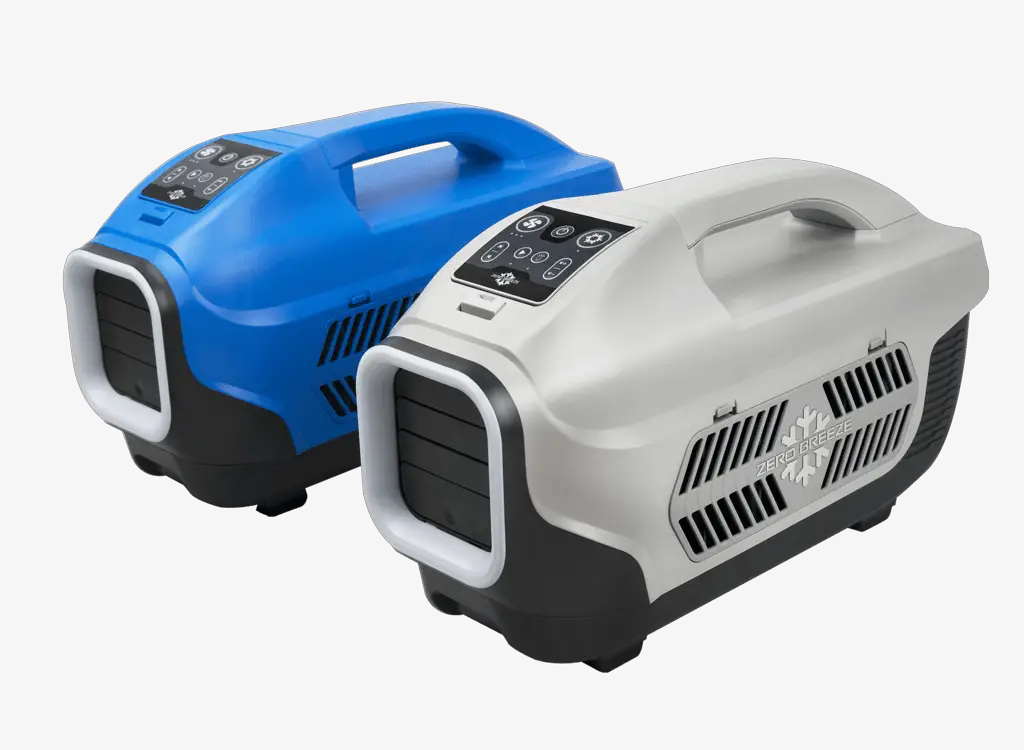

Zero Breeze
Safety Considerations for Using an AC in a Tent
Hooking up an AC to your tent can be a fun endeavor, but you need to remember that it's not the original spot these appliances were created to serve. So you need to ensure that they're adequately mounted and don't pose any hazards.
Proper Venting
Whichever type of air conditioner you decide to take, it needs to be set up correctly, as it would in normal conditions. Venting is a crucial issue both for window and portable units.
Portable ones need to have an exhaust hose. Some units (though not modern ones) might even require a drainage pipe. Modify your tent to accommodate the hose or hoses (in case of a dual hose AC).
In the case of the window unit, you might need to make a more significant modification, as the appliance needs to be half-outside. Once it's done, you can enjoy the cool and never look back.
Proper Maintenance
Only because you're camping doesn't mean that you should forget about your AC maintenance. If your filter is dirty, wash it or dust it off. If the unit got dirty for some reason (which is more than possible while camping), clean it immediately.
Follow that no debris gets into the coils from outside. Otherwise, it can damage the condenser and break the unit. Follow all the safety instructions in the manual as you would in proper conditions.
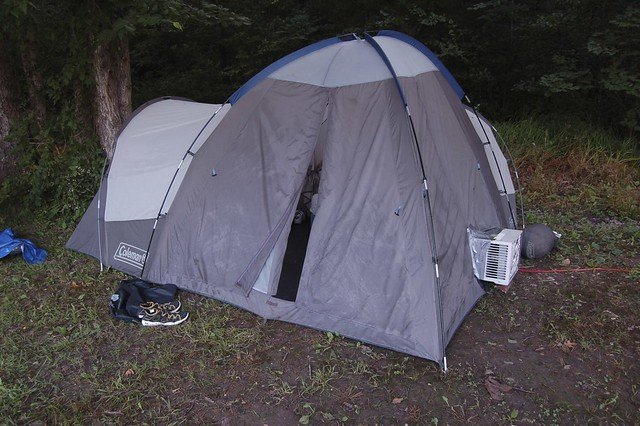

Photo credit: thatsnerdalicious.com
Generator or Battery Safety Considerations
If you're using a battery to power your AC, don't leave them out at the campsite.
These batteries can be robust fire hazards when affected by rain or lightning. Ensure to dispose of used ones or, even better, use rechargeable ones. In fact, it's better to have an extra so that you use them when needed and recharge the other ones.
Using a generator is another layer of safety considerations. If your AC uses a power source, it needs to be protected from natural and human influences.
The power lines need to be out of the way to stop people from walking around and accidentally tripping on them. You also need to isolate the open lines properly to be safe from short circuits and surges due to rain and lightning.
Types of Air Conditioners for Camping
When we say "tent air conditioners," we don't mean specific units solely created to cool tents. Usually, campers use some cooling system that's most appropriate for their trip purposes. Here are a few types of coolers that can be used in tents.
Evaporative Coolers
These are essentially large fans that might include humidification capability with an added tank of water.
The miniature varieties can work for up to a few people, but you need a bigger fan if you want a larger impact area. In case it's not enough, a couple of them might also work. In this case, ensure that your tent is secure; otherwise, you might "fly in a greenhouse."
Some evaporators can run on batteries, smarter ones will connect to a power bank for charging, and larger units are likely to need a generator to operate.
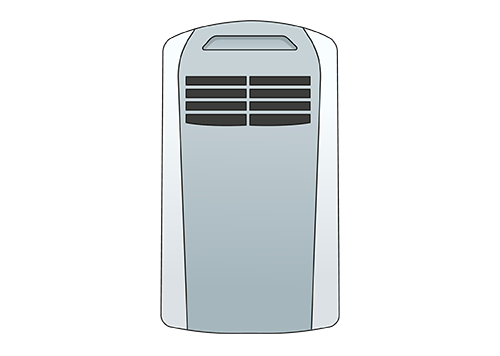

Portable Air Conditioners
If you're opting for more hardcore cooling and not just a breeze, portable ACs of 5,000 BTUs and above can do wonders in your tent. To lose less cool air, ensure that your tent is sufficiently insulated.
There are varieties of portable air conditioners that run on batteries and types that need a power generator to get going. Whichever you choose, these are likely to be more efficient than fans.
We recommend that you go for dual hose units instead of single-hose ones, as the negative air pressure is a worse issue for tents than houses.
Window Air Conditioners
You might not believe it, but window-mounted air conditioners make the best camping ACs out there. First of all, it's just one unit, which is usually smaller than the portable alternative.
Another improvement over the ones above is their price. Even if you decide to buy the cheapest unit, it will cool better and create fewer problems than a portable AC.
The two problems it creates are the following. First of all, you need to modify the tent to fit the unit through the material, as the rear part of a window unit needs to be outside. Next, window ACs need electricity to work. There are no battery-operated alternatives.
What Makes an Air Conditioner Great For Camping?
Camping is a very fun activity, however, your enjoyment can take a U-turn in the presence of hot winds and a sunny climate. This will not only make you feel sweaty but will also lead to your family and friends feeling agitated. One simple way to avoid this is to take a portable air conditioner with you camping. Here is what makes this product useful and important.
Portability
This is the most obvious benefit of the product. It usually comes in a small design, which makes portability easier. Its construction ensures durability, however, this strength doesn’t come at the cost of the weight. Moreover, since these units need to be moved a lot during camping, it is better that they are lightweight and do not require much energy to lift.
Power
You can't expect your unit to consume too much power on your camping trips, this will make them run out of energy quickly. Therefore, all of the air conditioners used for camping, come with better SEER, which makes them last for a longer time. Moreover, they need to maintain the same temperature throughout the night, which requires them to give a good cooling effect even in the smallest of places.
Size
When it comes to camping, the size of your air conditioner is very important. This is because camping already requires you to carry a plethora of things, thus having a heavy air conditioner is more likely to become problematic. For the best results, you can opt for an air conditioner with a BTU above 5000. The common sizes are 6000 and 8000, but these might be slightly larger than recommended.
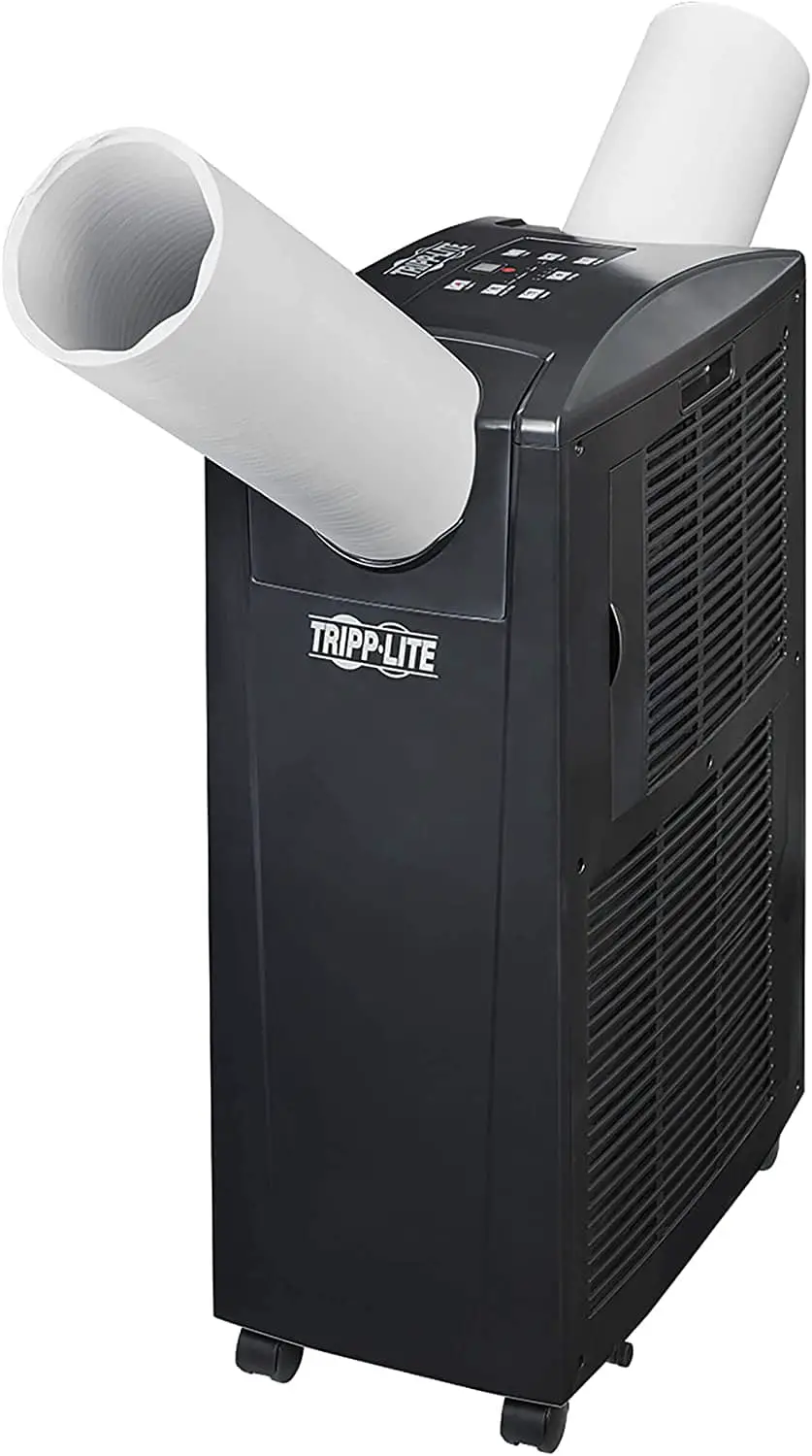

Tripp Lite SRCOOL12K
Conclusion
A good tent air conditioner needs to cool the tent area completely and have more than one mode. One that has cooling, fan, and a dehumidifier is ideal. It also has to be lightweight and portable so it can be carried to and from the campsite easily.
Each of the AC units we have reviewed are among the best air conditioning units for tents because they have the necessary features required for camping.
Depending on the amount of power you need and the price you are willing to pay, there is an air conditioning unit available to suit your camping needs. A good camping air conditioning unit can make a world of difference on the enjoyability of your camping trip.
Camping in the winter? Check out our buyers guide for tent heaters.
People Also Ask
People want their camping experiences to be absolutely perfect, therefore, they demand absolute honesty in product reviews. We scoured the internet to see what confuses people the most. We came across these top queries that people have in regards to portable air conditioners.
How Well Does AC Work in a Tent?
Air conditioners can work in a tent if you have a sufficient amount of power. While the AC might not perform very efficiently, it can still cool in usual conditions. However, if you want extra efficiency, try putting up extra insulation in your tent.
You can also choose a shady spot in the camping site that doesn't get too much sun to decrease the power your unit has to put out to combat the heat.
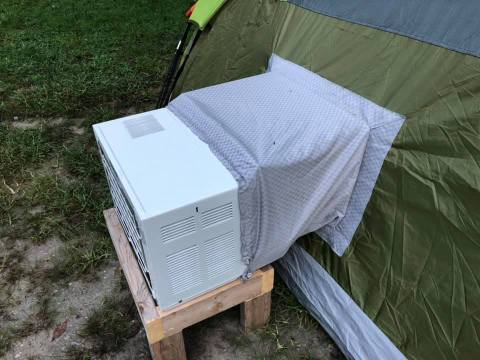

Photo credit: greatoutdoorworld.com
How Much Does It Cost to Air Condition a Tent?
As a general rule of thumb, tent air conditioning costs $1.00 to $1.50 per square foot. You can also use the BTU power calculation. One ton of air conditioning is needed for each 100 to 150 square feet.
Do Tent ACs Run on Batteries?
Generally, running a tent AC suggests that you either need a generator or the AC must be battery-powered.
Can You Put a Portable Air Conditioner in a Tent?
When it comes to putting your air conditioner in your tent, you need to consider things like ventilation and airflow. A 12V powered battery AC unit might not require any additional ventilation than the one built inside the tent.
However, electrical units will most definitely require outside ventilation and can't be placed inside the tent.
Can You Use a Window Air Conditioner in a Tent?
Most campers with tents prefer window air conditioners over others. This is because they have more cooling capacity than a normal air conditioner. However, with these units, installation can be a huge problem. You will need to customize your unit to fit in your tent. This might also require you to cut the tent.
